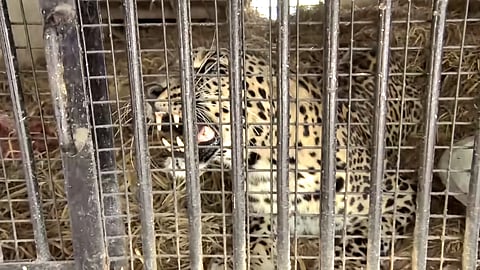

DEHRADUN: In the biodiversity-rich state of Uttarakhand, incidents of human-wildlife conflict have surged dramatically over the past decade, particularly with leopards encroaching on residential areas and launching deadly attacks.
The Uttarakhand government has announced plans to enhance the Wildlife and Rehabilitation Center in Chidiyapur, located near Haridwar in the Chidiyapur range.
Recent reports indicate that the number of man-eating leopards in the area has increased from six to sixteen in a short span of time.
According to the administration of the Chidiyapur Rescue Center, under the Uttarakhand Forest Department, aggressive leopards are confined in enclosures resembling "jails" and are not fed meat on Tuesdays.
"On this day, they must survive on a vegetarian diet," officials explained. At present, there are 16 leopards in Uttarakhand's forests, some serving life sentences due to their unpredictable behavior.
Sources within the Uttarakhand Forest Department stated that the Chidiyapur Rescue Center, which spans approximately 35 hectares, was initially established to treat injured animals. However, in recent years, it has also become a holding facility for several man-eating predators.
Located along Najibabad Road, this center now houses 14 man-eating leopards, all confined behind bars.
"The rescue center houses these predatory animals, which have been brought in from various regions, including Pauri, Joshimath, Kotdwar, and Haridwar," an official from the Forest Department said. "These animals have preyed on many people, and now they are under our care."
When the Forest Department first set up the Chidiyapur Rescue Center, it was equipped to house only six leopards. However, the capacity has gradually increased. "At present, the center can accommodate more than 16 leopards," an official noted. The Forest Department is considering further upgrades to the facility to accommodate even more leopards in the future.
Speaking exclusively to The New Indian Express, Senior Veterinary Officer Dr. Amit Dhyani provided insights into the Chidiyapur Rescue Center, saying, "The leopards housed here include Dara, Rocky, Mona, Ruby, Joshi, and Simba. A dedicated team from the Forest Department cares for them."
Dr. Dhyani, who has overseen the care of these man-eating leopards for nearly a decade, explained, "When the leopards are first brought here, they experience some discomfort adjusting to captivity. However, our team ensures they receive proper attention and routine check-ups. Once a rapport is established, the animals’ behavior improves significantly, and they become content living in their enclosures."
He also emphasized the seriousness of the situation, stating, "These leopards cannot be released back into the wild. Once they have exhibited man-eating behavior, it becomes dangerous for humans if they are set free."